
Browse an alphabetical list of documents from the Holocaust and World War II. These typed, handwritten, and artistic records are evidence of human experiences before, during, and after the Holocaust and war.
<< Previous | Displaying results 51-60 of 89 for "Document" | Next >>
Transit visa in a passport issued to Setty Sondheimer, a German citizen. This visa, issued on August 6, 1940, enabled her to travel through Japan en route to Surinam, Curacao, or other Dutch colonies in the Americas. These plans were disrupted when travel across the Pacific Ocean was forbidden following U.S. entry into World War II. Setty remained in Japan until she was able to emigrate to the United States in 1947. [From the USHMM special exhibition Flight and Rescue.]
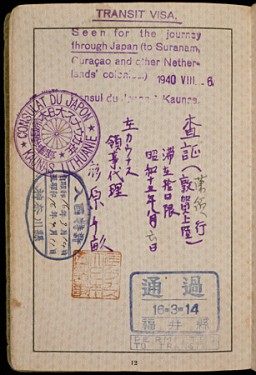
A page in a passport belonging to Setty Sondheimer containing stamps from Ecuador. These stamps are marked in red with the word "Anulado," the Spanish word for "canceled." The stamps were canceled when Setty's visa for Ecuador expired because she was unable to travel across the Pacific due to fighting in that theater. Setty remained in Japan for the duration of the war and emigrated to the United States in 1947. [From the USHMM special exhibition Flight and Rescue.]
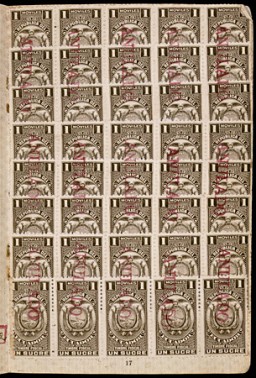
Setty and Moritz Sondheimer and their two children fled Nazi Germany for Kovno, Lithuania, in 1934. There, Moritz opened a small factory manufacturing buttons and combs. This image shows page 2, containing an identification photograph, of a passport issued to Setty Sondheimer by the German Consulate in Kovno on January 29, 1938. With aid from Japanese diplomat Chiune Sugihara in obtaining Japanese transit visas, Setty and her family emigrated from Kovno in February 1941. [From the USHMM special exhibition…
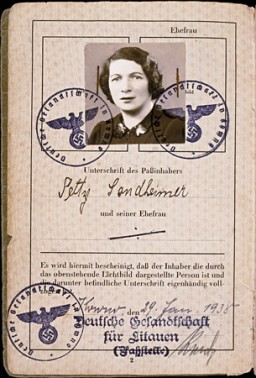
Page 5 of a passport issued to Setty Sondheimer by the German Consulate in Kovno on January 29, 1938. This page contains three visas: (1) visa for Kovno valid from August 27, 1940, until December 31, 1940 (2) a second visa for Kovno valid until June 30, 1941, and (3) first visa for Yokohama, Japan, valid from June 7, 1941, until June 30, 1942. Unable to emigrate from Japan, Setty remained there until she was able to emigrate to the United States in 1947. [From the USHMM special exhibition Flight and…
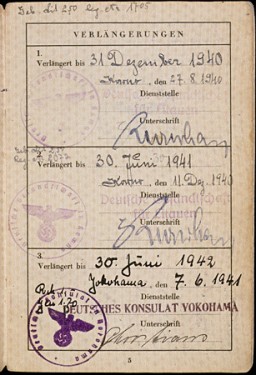
Page from Earl G. Harrison's notebook, recording his impressions of Linz, Austria, while on a tour of displaced persons camps in 1945.
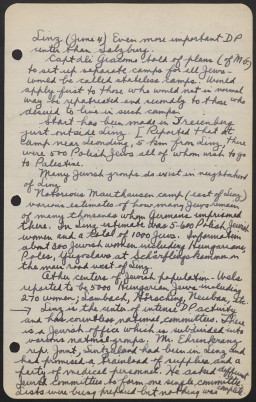
Special pass issued to rabbinical student Chaim Gorfinkel. Yeshiva students had to obtain special passes from Japanese authorities to leave the "designated area" in order to continue their studies at the Beth Aharon Synagogue, which was located outside the zone. [From the USHMM special exhibition Flight and Rescue.]
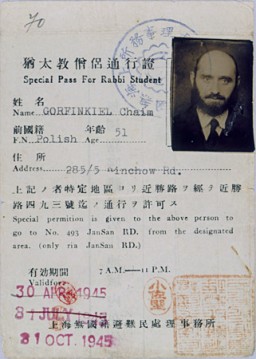
Special pass issued to rabbinical student Moshe Zupnik. Yeshiva students had to obtain special passes from Japanese authorities to leave the "designated area" in order to continue their studies at the Beth Aharon Synagogue, which was located outside the zone. [From the USHMM special exhibition Flight and Rescue.]
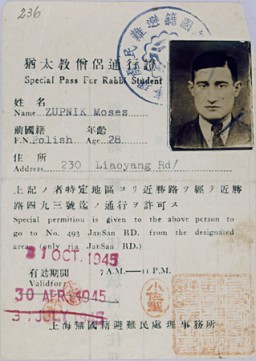
Most Polish Jewish refugees stayed in Japan much longer than their 10-day transit visas allowed. Many feared the day when Japanese authorities would no longer extend their stay with permits like the one shown here. [From the USHMM special exhibition Flight and Rescue.]
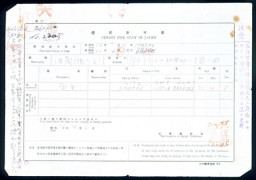
Japanese authorities issued this "Permit for stay in Japan" to Ruth Segal (Rys Berkowicz). After several unsuccessful attempts to obtain visas for the United States, Ruth's father was able to secure a visa for her to go to New Zealand, in the British Commonwealth of Nations. [From the USHMM special exhibition Flight and Rescue.]
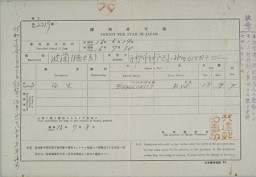
Plan of the two-propeller passenger liner the "St. Louis," showing cabins and room numbers. In 1939, this German ocean liner carried almost 1,000 Jewish refugees seeking temporary refuge in Cuba. It was forced to return to Europe after Cuba and then the United States refused to allow the refugees entry.
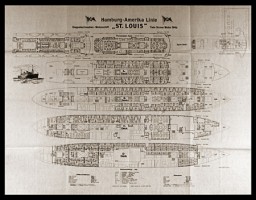
We would like to thank Crown Family Philanthropies, Abe and Ida Cooper Foundation, the Claims Conference, EVZ, and BMF for supporting the ongoing work to create content and resources for the Holocaust Encyclopedia. View the list of donor acknowledgement.